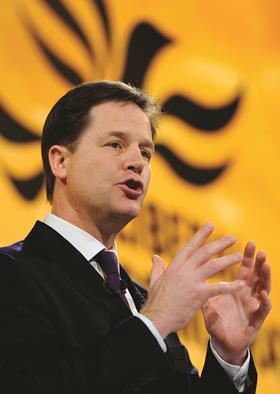As we approach the last party conference season before the general election, ║├╔л╧╚╔·TV offers a guide to where each party stands on construction issues
All eyes might be on the vote north of the border this week, but September is also expected to herald the start of the focus in earnest on another big vote: next yearтАЩs general election. Providing the outcome of the Scottish referendum, due to take place as ║├╔л╧╚╔·TV went to press, does not trigger a recall of parliament, then this yearтАЩs party conference season will kick off on Sunday when the Labour movement converges on Manchester. And thereтАЩs little doubt that when it does start - even if postponed - the vote next May will still be top of the agenda.
For construction industry lobbyists, the party conferences offer an invaluable opportunity to find out where the three major partiesтАЩ policies are heading next May. Party conference fringe meetings and evening receptions give a rare chance for the industry to get up close and personal with ministers and their shadows.
This yearтАЩs conference season - the last before the general election - will be of particular interest because of the extraordinarily fluid nature of modern British politics. Partly as a result of UKIPтАЩs growing support, next MayтАЩs general election is up for grabs. This means that the construction industry, which is so reliant on government both as a client and regulator, will be closely scrutinising the stances of all three big Westminster parties.
Read on for ║├╔л╧╚╔·TVтАЩs guide to where the Conservatives, Labour and the Lib Dems stand on the issues that count for construction - and what to watch out for at their annual policy get togethers.

Conservatives
The ConservativesтАЩ failure to win an outright majority at the 2010 general election has not tempered the partyтАЩs reforming zeal since it re-entered government. Big changes have included the scrapping of the ║├╔л╧╚╔·TV Schools for the Future programme and, on a happier note for the industry, the introduction of the National Policy Planning Framework.
However, the smoke signals from Tory HQ suggest that a future Conservative government would take a less whirlwind approach if they win back power next May.
The party remains committed to its free schools programme despite the sidelining of former education secretary Michael Gove during the summer reshuffle. And given that the Conservatives have been firmly in the coalition driving seat on housing and planning during the past four years, the thrust of policy on both issues looks set to be broadly maintained.
Chancellor George Osborne has already stated that the Help to Buy initiative, under which the government underwrites loans on all but the most expensive homes, will stay in place until the end of the next parliament. On planning, Home Builders Federation (HBF) external affairs director John Slaughter believes that change will focus on improved processes, such as speeding up decision-making and providing greater incentives for sites to come forward. However, Tory high commandтАЩs let rip approach to planning could prompt a backlash from the partyтАЩs grassroots, which are under increasing pressure from anti-development UKIP activists.
On the eco-building front meanwhile, UK Green ║├╔л╧╚╔·TV Council spokesman John Alker notes that the partyтАЩs annual conference has often been used by Tory ministers to parade their free-market, anti-green credentials. And although environmental building standards have already been watered down under the coalition, they are likely to face continued opposition within the Conservatives as prime minister David CameronтАЩs pledge to lead the тАЬgreenest government everтАЭ fades from memory.
Key question: Will the ConservativesтАЩ hostility to regulation result in watered-down green building standards?

Liberal Democrats
Judging by recent polls, any discussion of the Lib DemsтАЩ participation in the next government may appear irrelevant. However, the partyтАЩs success in last yearтАЩs Eastleigh by-election proved that the party performs better in the seats that it holds than it does across the board. So with neither the Conservatives nor Labour likely to be able to seal the deal with the electorate, the prospect of a coalition canтАЩt be discounted, which makes it worth keeping an eye on Lib Dem policy stances.
The partyтАЩs pre-manifesto, which is due to be debated at next monthтАЩs Glasgow annual party conference, includes an eye-catching commitment to increase housing delivery to 300,000 new homes a year, although it doesnтАЩt say by when. This ambitious target will be overseen by a ministerial taskforce, to be set up within a year of the next election. The Lib Dems balance their promises to build 10 new garden cities with the most strongly fleshed out policies on encouraging upgrades of existing homes. The partyтАЩs тАЬgreen manifestoтАЭ pledges council tax discounts for those householders who improve the energy efficiency of their properties through retrofit projects.
The HBFтАЩs Slaughter describes the list as тАЬpretty practicalтАЭ.
He says: тАЬIt shows the Lib Dems are taking housing a lot more seriously as an issue, which is to be welcomed.тАЭ
However, as they have found during the current parliament, the Lib Dems will need to have willing support from their prospective coalition partners for any of these proposals to become policy.
Key question: Which of the Lib DemsтАЩ policies will they sacrifice if they find themselves in coalition negotiations after the election?

Labour
At last yearтАЩs Labour conference, Ed Miliband rattled the City with his promise to introduce an energy price freeze. This year, the Labour leader is using his keynote appearance to unveil the conclusions of the partyтАЩs Lyons Housing Review.
тАЬIf there isnтАЩt a тАШyesтАЩ vote [in the Scottish referendum] we can expect a reasonable chunk of the speech to be devoted to housing. Labour have made it clear that housing will be one of their main themes for the election,тАЭ says the HBFтАЩs Slaughter.
The big worry for housebuilders is that Labour will implement MilibandтАЩs pledge to punish alleged land banking by developers, which Slaughter hopes will be toned down following the review.
Labour has also pledged to give a greater priority to brownfield sites than the current government, and could make common cause with the Lib Dems on promoting new towns if the two parties find themselves in coalition after the next election.
Small housebuilders would find themselves in the rare position of celebrating a Labour government following the partyтАЩs commitment to ease their access to finance and government land.
On infrastructure, Civil Engineering Contractors Association chief executive Alasdair Reisner says Labour is most in tune with the industryтАЩs desire to promote a long-term approach to the sector. The partyтАЩs draft bill to implement the Armitt reviewтАЩs proposal for a 25 to 30-year infrastructure strategy is so well advanced that it would be ready for a future Labour governmentтАЩs first QueenтАЩs Speech.
Labour has also committed to seeing through the next wave of the governmentтАЩs Priority School ║├╔л╧╚╔·TV and free schools programmes. It is also likely to place more emphasis on remedying classroom overcrowding. However, Marcus Fagent, head of education and childrenтАЩs services at EC Harris, says the industry most wants Labour, if it comes to power, to push ahead with existing programmes and not waste time on lengthy reviews, noting how construction тАЬstill bears the scarsтАЭ from the way that the current government halted BSF.
Key question: Will Labour tear up its commitment to retain the coalition governmentтАЩs free school building programme?


























No comments yet